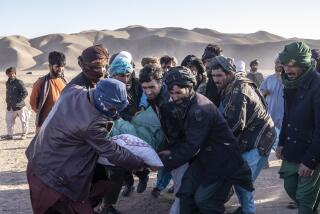Afghan City Begins Waking Up to Hope
- Share via
KANDAHAR, Afghanistan — Just six weeks after the Taliban’s rule collapsed and the U.S. bombs stopped falling here, a mixture of anticipation and optimism is growing in the birthplace of the extremist regime.
No one says it out loud, but there is a distinct feeling among long-suffering residents that Afghanistan’s nightmare--one that began in 1979 with an invasion of Soviet troops and then brought civil war, isolation and U.S. military power--may be over.
On Tuesday, this optimism was buoyed as news from Tokyo filtered through this southern city that the world’s richest countries had pledged $4.5 billion toward rebuilding the shattered country.
Even the heavens made a contribution Tuesday: It rained in Kandahar in the evening, marking the second rainy day in a week for a region where drought has been war’s twin plague over the last five years.
“I think good things will happen now,” said 19-year-old Shah Mohammed, who is jobless but hopeful.
Although expectations for a better future are high, Kandahar is still very much a city at the start of a long and difficult transition.
The inventory at one grocery store is enough to underscore that. Shopkeeper Obaidullah, who, like many Afghans, uses only one name, sells Dutch nonalcoholic beer--something he wouldn’t have dared offer during the Taliban era. But a few feet away, he still offers a large selection of individually wrapped candies anchored in Afghanistan’s past: bonbons wrapped in colorful paper sporting a likeness of Osama bin Laden.
“They still sell well,” Obaidullah said.
Nonetheless, he believes that his country--and its new government--is on the right track. Here in the heart of Afghanistan’s “Pushtun Belt,” Afghans are proud of the country’s interim prime minister, Hamid Karzai, who, as a Pushtun, is one of their ethnic brethren.
“A wise and literate man,” Obaidullah summed up. “I think he’ll give us a good government. It’s already better than before.”
Ethnic tensions persist, however. Rumors swept the city Tuesday that a new conflict might be around the corner, this time with forces loyal to warlord Ismail Khan, a Shiite Muslim leader in the western city of Herat.
Word that Shiites were persecuting ethnic Pushtuns, who are Sunni Muslims and make up the country’s largest ethnic group, was so strong that city officials had to address them. Mohammed Yusef Pushtoon, a senior aide to provincial Gov. Gul Agha Shirzai, denied reports that an armed force was being dispatched to march on Herat.
Shirzai has launched a campaign to curb a law-and-order situation that clearly had gotten out of hand in the wake of the Taliban’s demise. The governor has worked to curtail the number of weapons toted around in public, although he personally cruises the city in a white sport-utility vehicle trailed by two pickup trucks loaded with uniformed guards bristling with weaponry.
Police have donned new uniforms--but outside the city, in rural areas, officers appear uncertain about what to wear with the camouflage shirt and trousers.
Not far from the border with Pakistan on the arterial road that links Kandahar to the southern hinterland, reporters were halted by freshly uniformed police, including one sporting pink socks and sandals.
There are other signs of transition along the road--signs that serve as a reminder of just how desperate conditions are in the country.
Beggars are replacing bandits, making for a safer if more depressing journey into the city. On Tuesday, small groups of young boys and the occasional elderly man stood, braced and squinting against the wind, holding out hands to passing cars. Invariably, the beggars got only more dust kicked in their faces.
Those who stand for more than a few minutes by the road are coated in dirt, almost invisible except for the eyes and teeth that shine through the dull coating like reflectors. The road itself, once a model of U.S.-financed know-how, in some places hardly exists anymore after years of war and neglect.
“With God’s help, maybe this will be a good road again someday,” said a security guard, Mohammed. “But we first have many other things to do.”
On his fingers, he ticked off a long list. It began with education and jobs and went on for several minutes.
More to Read
Sign up for Essential California
The most important California stories and recommendations in your inbox every morning.
You may occasionally receive promotional content from the Los Angeles Times.









